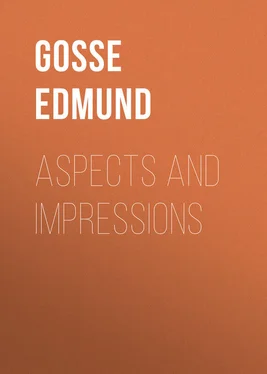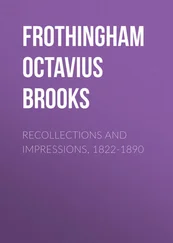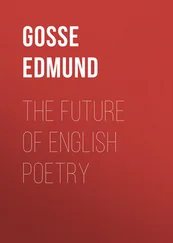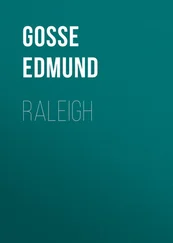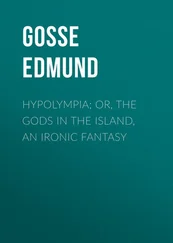Edmund Gosse - Aspects and Impressions
Здесь есть возможность читать онлайн «Edmund Gosse - Aspects and Impressions» — ознакомительный отрывок электронной книги совершенно бесплатно, а после прочтения отрывка купить полную версию. В некоторых случаях можно слушать аудио, скачать через торрент в формате fb2 и присутствует краткое содержание. Жанр: Критика, foreign_antique, foreign_prose, на английском языке. Описание произведения, (предисловие) а так же отзывы посетителей доступны на портале библиотеки ЛибКат.
- Название:Aspects and Impressions
- Автор:
- Жанр:
- Год:неизвестен
- ISBN:нет данных
- Рейтинг книги:4 / 5. Голосов: 1
-
Избранное:Добавить в избранное
- Отзывы:
-
Ваша оценка:
- 80
- 1
- 2
- 3
- 4
- 5
Aspects and Impressions: краткое содержание, описание и аннотация
Предлагаем к чтению аннотацию, описание, краткое содержание или предисловие (зависит от того, что написал сам автор книги «Aspects and Impressions»). Если вы не нашли необходимую информацию о книге — напишите в комментариях, мы постараемся отыскать её.
Aspects and Impressions — читать онлайн ознакомительный отрывок
Ниже представлен текст книги, разбитый по страницам. Система сохранения места последней прочитанной страницы, позволяет с удобством читать онлайн бесплатно книгу «Aspects and Impressions», без необходимости каждый раз заново искать на чём Вы остановились. Поставьте закладку, и сможете в любой момент перейти на страницу, на которой закончили чтение.
Интервал:
Закладка:
Had we lost him soon after the appearance of the latest of these prefaces – that prefixed to The Golden Bowl , in which the effort to reveal something which is not revealed amounts almost to an agony – it would have been impossible to reconstruct the life of Henry James by the closest examination of his published writings. Ingenious commentators would have pieced together conjectures from such tales as The Altar of the Dead and The Lesson of the Master , and have insisted, more or less plausibly, on their accordance with what the author must have thought or done, endured or attempted. But, after all, these would have been "conjectures," not more definitely based than what bold spirits use when they construct lives of Shakespeare, or, for that matter, of Homer. Fortunately, in 1913, the desire to place some particulars of the career of his marvellous brother William in the setting of his "immediate native and domestic air," led Henry James to contemplate, with minuteness, the fading memories of his own childhood. Starting with a biographical study of William James, he found it impossible to treat the family development at all adequately without extending the survey to his own growth as well, and thus, at the age of seventy, Henry became for the first time, and almost unconsciously, an autobiographer.
He had completed two large volumes of Memories , and was deep in a third, when death took him from us. A Small Boy and Others deals with such extreme discursiveness as is suitable in a collection of the fleeting impressions of infancy, from his birth in 1843 to his all but fatal attack of typhus fever at Boulogne-sur-Mer in (perhaps) 1857. I say "perhaps" because the wanton evasion of any sort of help in the way of dates is characteristic of the narrative, as it would be of childish memories. The next instalment was Notes of a Son and Brother , which opens in 1860, a doubtful period of three years being leaped over lightly, and closes – as I guess from an allusion to George Eliot's Spanish Gypsy – in 1868. The third instalment, dictated in the autumn of 1914 and laid aside unfinished, is the posthumous The Middle Years , faultlessly edited by the piety of Mr. Percy Lubbock in 1917. Here the tale is taken up in 1869, and is occupied, without much attempt at chronological order, with memories of two years in London. As Henry James did not revise, or perhaps even re-read, these pages, we are free to form our conclusion as to whether he would or would not have vouchsafed to put their disjected parts into some more anatomical order.
Probably he would not have done so. The tendency of his genius had never been, and at the end was less than ever, in the direction of concinnity. He repudiated arrangement, he wilfully neglected the precise adjustment of parts. The three autobiographical volumes will always be documents precious in the eyes of his admirers. They are full of beauty and nobility, they exhibit with delicacy, and sometimes even with splendour, the qualities of his character. But it would be absurd to speak of them as easy to read, or as fulfilling what is demanded from an ordinary biographer. They have the tone of Veronese, but nothing of his definition. A broad canvas is spread before us, containing many figures in social conjuncture. But the plot, the single "story" which is being told, is drowned in misty radiance. Out of this chiaroscuro there leap suddenly to our vision a sumptuous head and throat, a handful of roses, the glitter of a satin sleeve, but it is only when we shut our eyes and think over what we have looked at that any coherent plan is revealed to us, or that we detect any species of composition. It is a case which calls for editorial help, and I hope that when the three fragments of autobiography are reprinted as a single composition, no prudery of hesitation to touch the sacred ark will prevent the editor from prefixing a skeleton chronicle of actual dates and facts. It will take nothing from the dignity of the luminous reveries in their original shape.
Such a skeleton will tell us that Henry James was born at 2 Washington Place, New York, on April 15th, 1843, and that he was the second child of his parents, the elder by one year being William, who grew up to be the most eminent philosopher whom America has produced. Their father, Henry James the elder, was himself a philosopher, whose ideas, which the younger Henry frankly admitted to be beyond his grasp, were expounded by William James in 1884, in a preface to their father's posthumous papers. Henry was only one year old when the family paid a long visit to Paris, but his earliest recollections were of Albany, whence the Jameses migrated to New York until 1855. They then transferred their home to Europe for three years, during which time the child Henry imbibed what he afterwards called "the European virus." In 1855 he was sent to Geneva for purposes of education, which were soon abandoned, and the whole family began an aimless wandering through London, Paris, Boulogne-sur-Mer, Newport, Geneva, and America again, nothing but the Civil War sufficing to root this fugitive household in one abiding home.
Henry James's health forced him to be a spectator of the war, in which his younger brothers fought. He went to Harvard in 1862 to study law, but was now beginning to feel a more and more irresistible call to take up letters as a profession, and the Harvard Law School left little or no direct impression upon him. He formed a close and valuable friendship with William Dean Howells, seven years his senior, and the pages of the Atlantic Monthly , of which Howells was then assistant editor, were open to him from 1865. He lived for the next four years in very poor health, and with no great encouragement from himself or others, always excepting Howells, at Cambridge, Massachusetts. Early in 1869 he ventured to return to Europe, where he spent fifteen months in elegant but fruitful vagabondage. There was much literary work done, most of which he carefully suppressed in later life. The reader will, however, discover, tucked away in the thirteenth volume of the Collected Edition, a single waif from this rejected epoch, the tale called A Passionate Pilgrim , written on his return to America in 1870. This visit to Europe absolutely determined his situation; his arrival in New York stimulated and tortured his nostalgia for the old world, and in May, 1872, he flew back here once more to the European enchantment.
Here, practically, the biographical information respecting Henry James which has hitherto been given to the world ceases, for the fragment of The Middle Years , so far as can be gathered, contains few recollections which can be dated later than his thirtieth year. It was said of Marivaux that he cultivated no faculty but that de ne vivre que pour voir et pour entendre . In a similar spirit Henry James took up his dwelling in fashionable London lodgings in March, 1869. He had come from America with the settled design of making a profound study of English manners, and there were two aspects of the subject which stood out for him above all others. One of these was the rural beauty of ancient country places, the other was the magnitude – "the inconceivable immensity," as he put it – of London. He told his sister, "The place sits on you, broods on you, stamps on you with the feet of its myriad bipeds and quadrupeds." From his lodgings in Half Moon Street, quiet enough in themselves, he had the turmoil of the West End at his elbow, Piccadilly, Park Lane, St. James's Street, all within the range of a five minutes' stroll. He plunged into the vortex with incredible gusto, "knocking about in a quiet way and deeply enjoying my little adventures." This was his first mature experience of London, of which he remained until the end of his life perhaps the most infatuated student, the most "passionate pilgrim," that America has ever sent us.
Читать дальшеИнтервал:
Закладка:
Похожие книги на «Aspects and Impressions»
Представляем Вашему вниманию похожие книги на «Aspects and Impressions» списком для выбора. Мы отобрали схожую по названию и смыслу литературу в надежде предоставить читателям больше вариантов отыскать новые, интересные, ещё непрочитанные произведения.
Обсуждение, отзывы о книге «Aspects and Impressions» и просто собственные мнения читателей. Оставьте ваши комментарии, напишите, что Вы думаете о произведении, его смысле или главных героях. Укажите что конкретно понравилось, а что нет, и почему Вы так считаете.
